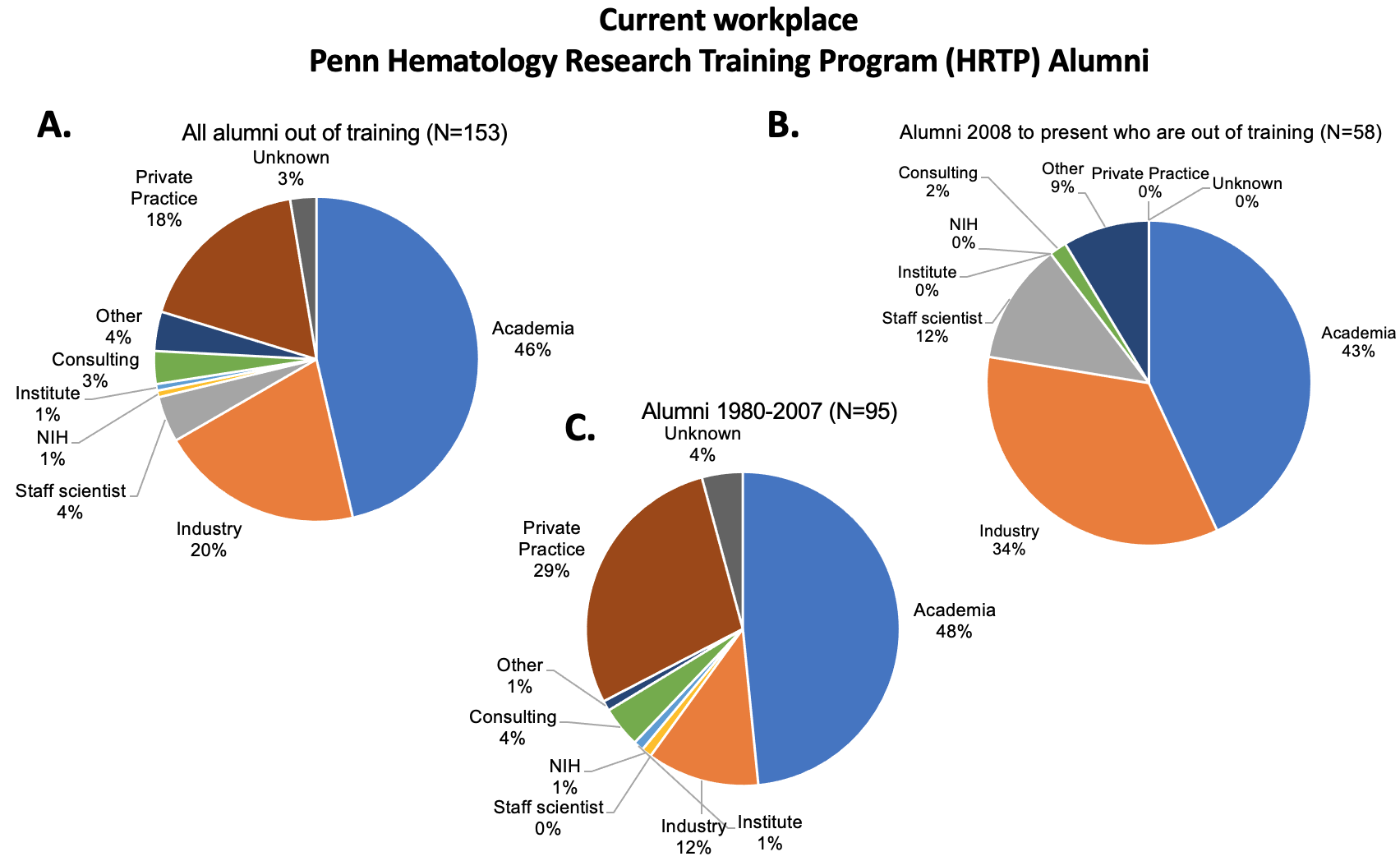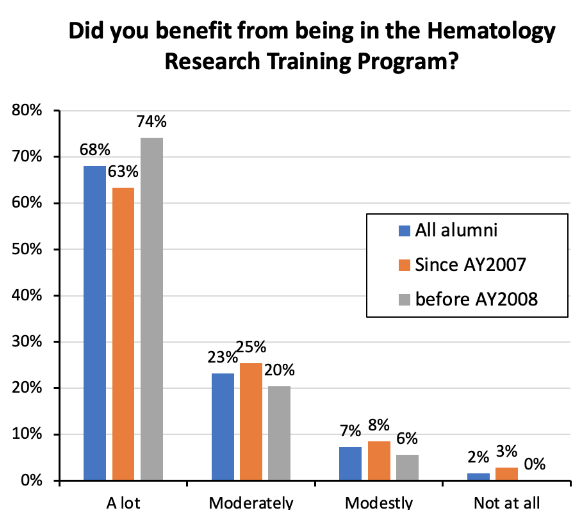Program Outcomes and Alumni
Program Outcomes
179 Hematology Research Training Program trainees have been supported to date, including 143 postdocs (31 MD/PhD, 65 MD and 47 PhD) and 36 predocs (23 MD/PhD and 13 PhD). Of the 153 who have completed all subsequent stages of training, 76% have positions that we consider appropriate outcomes for alumni of this training program, including 71 (46%) who have full-time appointments at an academic institution and 31 (20%) who are employed in the biotech or pharmaceutical industry.

Our alumni speak: How did being in the HRTP help you?
- "Additional mentoring from T32 committee for career development and experiments in lab; networking with UPenn hematology community; connection with NIH POs to apply for and receive K08 grant."
- "Learned how to write an NRSA grant. Learned how to conduct bench research in hemostasis/platelet physiology which led to my career interest in Transfusion Medicine. Benefited from weekly research conferences at which laboratory and clinical research being conducted in the Hem/Onc Department were discussed."
- "Annual T32 trainee presentation day provided valuable feedback."
- As a post-doctoral fellow under a PI based at CHOP, the hematology program helped me make connections at Penn.
- "Excellent mentorship still impacts how I do things today; how I address problems and how I ask questions. Funding allowed me to spend that extra time needed to grow as a Hematologist and a scientist."
- "Exposure to the field of basic science research, learn skills in how to design a study, interpret data, pivot when things don't turn out as planned, write a scientific paper, interpret literature."
- "Feedback on science from Dr. Brass and reviewers of the T32 was very useful as I prepared the work for publication. Connecting with fellow T32 recipients and postdocs in my field has provided me excellent points of contact when needing to test new experimental systems/reagents and discussing future career plans."
- "Formal research mentoring through the formation of a mentorship committee, annual venue to present my research to internal/external advisory board and receive feedback, use of training-related expenses to purchase needed technology upgrades for data processing/analysis."
- "Additional mentoring from T32 committee for career development and experiments in lab; networking with UPenn hematology community; connection with NIH POs to apply for and receive K08 grant."
- "Support and mentorship during critical training years."

Past Trainees
Some of Our Recent Trainees
Ruth Choa
Ruth Choa, MD, PhD was a student in the MD/PhD program who did her graduate work with HRTP faculty member, Taku Kambayashi, MD, PhD. Ruth graduated magna cum laude from Harvard in 2014, where she majored in biomedical engineering and had 5 publications from work she did before she came to Penn. During her first 3 years in the MD/PhD program she completed her preclinical requirements, 6 months of core clerkships and the coursework required for a PhD immunology. She was nominated and appointed to the HRTP in 2017, subsequently applying for and receiving an American Heart Association fellowship. She attended a weekly immunology colloquium, an immunology journal club and weekly research in progress meeting. Her thesis project was published as a first author paper in Science (Choa, et al., 2021), after which she completed medical school and matched in the Physician Scientist Pathway residency program in medicine at Harvard/MGH. Among other accolades, Ruth was the 2022 recipient of the award given annually to the top graduating MD/PhD student applying in internal medicine or pediatrics, an award established by Penn alumnus and Nobel Laureate, Michael Brown.
Scott Peslak, MD, PhD
Scott Peslak, MD, PhD is a former Hematology Research Training Program trainee. Dr. Peslak is currently an Instructor in Hematology in the Department of Medicine. He completed the MD/PhD program at the University of Rochester, followed by a residency in internal medicine at Penn. He worked on stress erythropoiesis for his PhD, publishing 2 first author publications and competing successfully for an F30 award. Scott was appointed to the HRTP in 2017, working with Gerd Blobel, MD, PhD on new approaches that might prove helpful in the management of patients with sickle cell disease and studying the role of a recently identified regulator of fetal hemoglobin (HbF), heme-regulated inhibitor (HRI). Scott showed that HRI depletion increases HbF expression and reduces sickling in vitro (Peslak et al. Blood Adv. 2020). He also uncovered the downstream mechanism involved (Huang, Peslak et al. Blood 2020). More recently, he has worked on the mechanisms underlying the developmental HbF regulator HIC2 (Huang, Peslak et al. Nat. Genetics 2022) and published a manuscript on improving SCD management in the outpatient infusion center setting (Peslak et al. Blood Adv. 2022). He has presented his work at the American Society of Hematology Annual Meeting and the Red Cell Club Meeting, and in 2023 is an invited speaker at the Red Cells Gordon Research Conference and the European Society of Hematology Translational Research Conference on Erythropoiesis Control and Ineffective Erythropoiesis. Finally, he has competed successfully for a K08 award and will be transitioning to an independent laboratory in 2023, with plans to apply for an R01 in the next 1-2 years.
Izmarie Poventud-Fuentes, PhD
Izmarie Poventud-Fuentes, PhD did her graduate work in the Pharmacology PhD program with Skip Brass, MD, PhD. She had previous completed college at the University of Puerto Rico, followed by a postbac at Case Western Reserve University. She had 4 co-author publications prior to graduate school. She completed all the course work required for her PhD and passed her qualifying exam at the end of her second year in graduate school. Izma was appointed to the HRTP in 2017, using support from the program to attend a week-long course in quantitative fluorescence microscopy in Bar Harbor. Her main project was to develop a microfluidics device that models the hemostatic response to injury in humans using human blood and human endothelial cells. That work was completed in collaboration with Dan Huh in Penn’s School of Engineering and published in Small (Poventud- Fuentes, et al. A Human Vascular Injury-on-a-Chip Model of Hemostasis). A patent application has been filed on the device. While in the HRTP, Izma attended conferences and symposia, including the 2019 ISTH conference in Berlin. Career development activities included Platelet club, a journal club, and the UPenn/SACNAS academic development workshops. She also completed the Graduate Training in Medical Sciences Certificate Program. Izma graduated in 2020 after which she completed a two-year clinical chemistry fellowship at Baylor University. She is currently an Assistant Professor at Penn in the Department of Pathology.
Anna Sternberg, PhD
Anna Sternberg, PhD is a current postdoctoral researcher under the mentorship of Lindsey George, MD. In her most recent annual report, Dr. Sternberg notes that while in the HRTP she received further training in biochemistry, working to rationally design and engineer therapeutics for hemophilia A. She also said that with the support and mentorship from faculty from the training program, she had learned a great deal on topics related to her research project, as well as how to better communicate science to others and develop professional connections. Finally, she noted that the mentoring and financial support from the HRTP helped provide the resources necessary to advance her career. She had the opportunity to attend both domestic and international conferences, and presented 4 oral and 1 poster abstract, for which she received multiple awards. She is currently writing the first of a projected series of 3 manuscripts.

